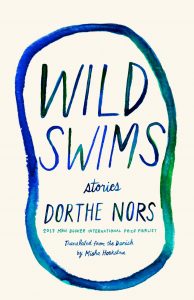Reviewed by Natalie Argentina

Danish author Dorthe Nors delves into the underlying nature of humanity in her collection of stories, analyzing different factions of love and heartbreak in the latest edition to her literary collection, Wild Swims. This work of fiction comes over a decade after her first collection of stories, Karate Chop. Like Karate Chop, this collection of stories places the mystery of the character’s past at the forefront of the story, urging readers to expand their definition and perception of what it means to be human.
Wild Swims follows fourteen different characters from all over the world, from Europe to the United States, while subtly but impressionably detailing their longing search for acceptance and belonging. Though none quite seem to find what they are looking for, the openness of the stories allows readers to draw their own conclusions about each character and their various entanglements.
Through a stripped setting and suggestive imagery, Nors leaves quite a bit to the imagination. She provides an almost blank slate for readers to grapple with their own sense of humanness and love. It becomes difficult to refrain from filling gaps with one’s own emotions—making the stories that much more powerful in identifying one’s own driving forces. In addition, the simplicity of the setting and tone add to the growing complexity of the various characters.
While reflection of one’s emotions is almost necessary in the reading of these stories, no great leap is needed to understand the deeper meaning behind the stories, as each leaves the reader feeling as though they gained insight on not only the characters, but themselves and their own perception of what it means to be human. This juxtaposition of suggestiveness and realness makes each story more approachable and each character more relatable.
The stories foster a realist interpretation of the foundation of humanness as close attention to detail is maintained throughout the various settings and plotlines. From the first story to the last, Nors highlights love and belonging as the driving force behind humanity, from which no one is exempt. From a man setting his eyes on the Mississippi River for the first time in “Between Offices” to an intellectual disconnect between lovers in “Hygge,” characters come to life with their undeniable humanity and continuous reflections on their past lives. From a man escaping his emotions in the deep woods in “In a Deer Stand” to a pair of friends uncovering the hidden lives of those behind naked or eclectic apartment doors in “By Sydvest Station,” readers begin to understand Nors’ intentional depiction of starkly different characters and their relation to their own humanity. She highlights the importance of the individual while simultaneously reinforcing the trope of a common being and purpose.
Her choice to paint humanity as a collective being parallels her choice to compile these fourteen stories into a collective, all-encompassing book. In other words, each person has their own story under the greater story of humanity, while each character has their own story under the greater story of Wild Swims.
Nors’ exploration of the human capacity for love throughout the fourteen enlightening short-stories in Wild Swims guides readers through a self-reflection of their own heart. She unearths hidden truths about living and loving as she encourages readers to read between the lines, in her stories and in their own lives. Offering a rare take on the expansive nature of the human heart, Nors’ unique voice engages readers and establishes Wild Swims as a realistic portrayal of love in relation to humanity.
Wild Swims is an easy, entertaining read with continuous points for self-reflection throughout its pages. I would recommend this book to anyone looking for something innovative and fresh, or anyone looking to explore the pits of their own humanity. Each story offers a unique, almost mesmeric take on mankind and the driving forces behind humanity: love and belonging.
